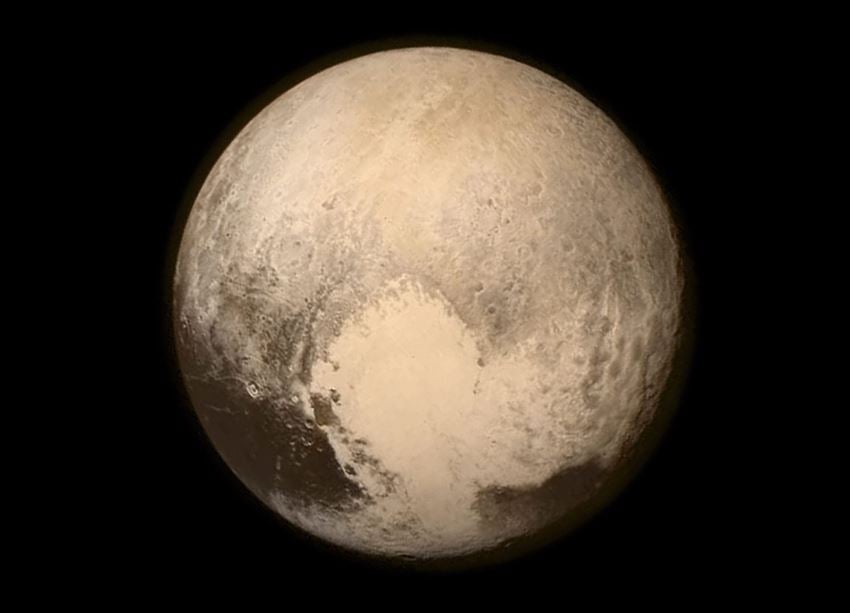
This week, for the first time, the NASA’s New Horizons Probe flew by Pluto, awakening a debate on the planet/dwarf planet argument.
The truth is, Pluto may be a dwarf planet as long as the current rules apply – this may never change. For instance, Pluto is much closer in size to other dwarf planets like Makemake and Eris. This is the surface argument by the IAU.
There are other rules, however, more pressing factors, and these factors seem to point to contrasting beliefs and facts.
In 2006, the International Astronomical Union (IAU) decided to reclassify Pluto as a dwarf planet, on three terms: the object must orbit the Sun, the neighborhood of its orbit must be cleared of debris and it must be large enough that the force of its orbit has pulled the object into a round shape.
Pluto failed on one aspect – its neighborhood is not clear of debris – being surrounded by ice and rock in the Kuiper belt. Here are the popular arguments in favor of Pluto as a planet. Included are the facts as well!
So Pluto is small, but so is the Earth. At least in comparison with giants like Jupiter. If you paid attention to the mass of Earth and the mass of Jupiter, and then the mass of Pluto as opposed to the mass of Earth, you would be able to see an interesting comparison.
The size of Earth compared to the size of Jupiter is very like the size difference between Pluto and Earth. So, how can we honestly use this as an indication? Who says how big we have to be in order to be part of the group? Sounds like unfair judgment to me! Size shouldn’t matter, remember… But I get it, we have to draw the line somewhere.
Pluto is in the Kuiper belt, I know. But it’s different than those other ice chunks and rocks. Pluto, Ceres, Eris and other dwarf planets are large enough for gravity to pull them into nicely formed round shapes.
Pluto is also orbited by five moons, has a rocky core surrounded by an ice mantle and a thin atmosphere. With this being said, Pluto has more in common with planets in our solar system than objects in the Kuiper belt. To me, this is enough to include her into our group.
Because Pluto is part of the various ice and chunks of rock in the Kuiper belt, it’s considered a “non-planet”. According to the IAU, Pluto has not “cleared its neighborhood”.
A funny thing about that is, the Earth gets hit with just as many asteroids and comets as Pluto. What’s the difference? Just like Ceres, now classified as a dwarf, was once considered a planet when discovered in the 1800s, Pluto has been reclassified by its neighbors. I guess this makes sense as a disqualifying factor or does it.
Phillip Metzger, planetary scientist at the University of Central Florida says,
“If we can move Pluto to another position, it could become a planet.”
David Aguilar of the Harvard-Smithsonian Center for Astrophysics says in contrast,
“If we can adjust the definition of planet, just slightly, then Pluto can be included in our solar system.”
This idea seems feasible and can be simplified. There are two types of planets: gas and rocky. Why not have a third type called dwarf planets, included into the larger scope of things. Now, that seems like a quick fix.
Are we going to keep flying by, staring at the beauty of Pluto while denying her right to be a planet of our solar system? Maybe we will and maybe, as of August 2015, we will have a change of heart, so to speak.
We will soon know, and as for me, I’m rooting for Pluto and planet status! To heck with that ‘dwarf planet’ classification. Tis the time for equality, right!
View Comments
Excellent points and I would love to see Pluto welcomed back to the adult table as well. Changing scientific reality, once it has been voted upon, is never easy.
that doesn't make any sense
Well pointed. Some of the reasons I didn't know.
Nice article
learning-mind
nice
Very detailed, maybe next time add in your opinion, it might even support your debate even more.
P.S: Just my opinion, this article is amazing!